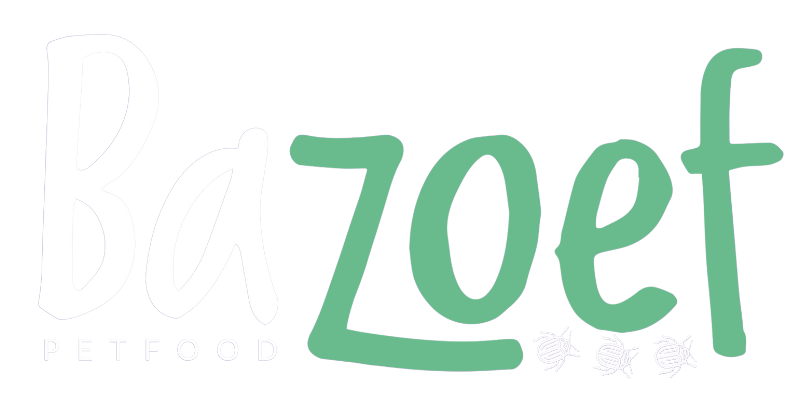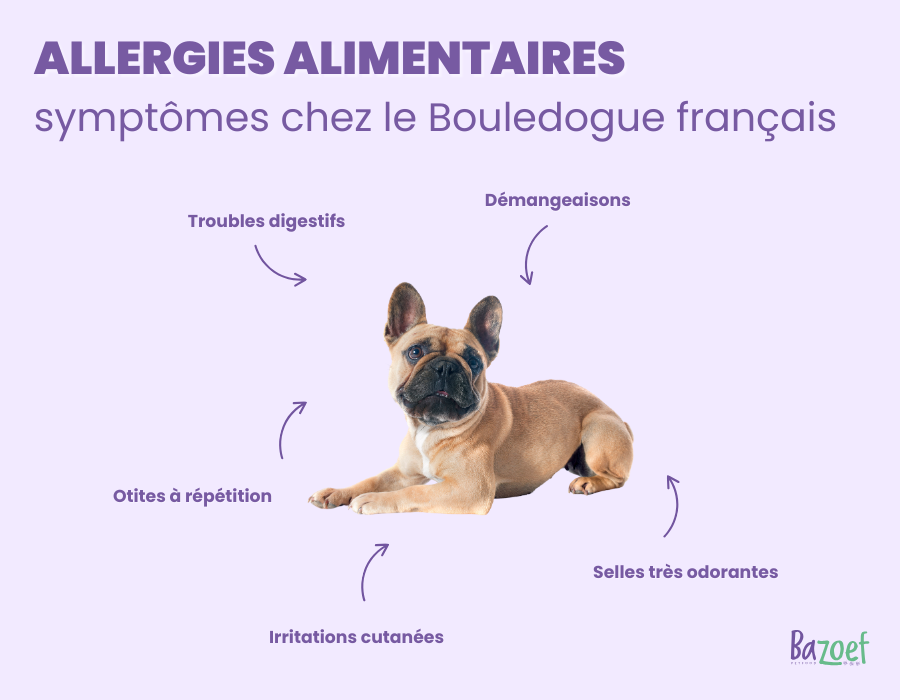The French Bulldog is a charming, energetic, and popular breed.
But behind its sturdy appearance lies a dog that’s often prone to allergies—especially food and skin-related ones.
If your pup is constantly scratching, losing fur, or showing signs of digestive trouble, an allergy could be the culprit.
In this article, we’ll help you identify the possible causes of these allergies, recognize the typical symptoms, and most importantly, explore practical solutions to provide lasting relief for your French Bulldog.

Common Food Triggers for Allergies in French Bulldogs
Food allergies are among the most common health issues in French Bulldogs.
They often appear as digestive problems (diarrhea, vomiting, gas) or skin issues (itchiness, redness, hair loss).
Animal proteins like chicken, beef, or fish, as well as grains such as wheat and corn, are frequent culprits.
📊 Table – Common Kibble Ingredients Linked to Allergies in French Bulldogs
| Common Ingredient (in kibble) | Typical Reactions Observed |
| Wheat, wheat gluten | Digestive issues, gas, strong-smelling stools due to excessive gut fermentation |
| Chicken by-products | Itching, chronic ear infections, digestive trouble (common intolerance in French Bulldogs) |
| Pork meal | Similar risks as chicken: skin irritation, diarrhea, gas |
| Rice | Generally well tolerated, but can cause bloating if poorly digested or overused |
| Beet pulp | A fiber source; in excess, may cause soft stools or gas |
| Fish oil | Rich in omega-3s and usually beneficial, but too much may lead to loose stools |
Foods That Are Generally Better Tolerated by Sensitive French Bulldogs
More Tolerable Protein Sources
In French Bulldogs prone to food allergies, common proteins like chicken or beef often lead to repeated skin issues, digestive trouble, or chronic ear infections.
To reduce these sensitivities without compromising nutritional quality, consider switching to alternative, less allergenic proteins—also known as “novel proteins.”
These less common sources—like insect protein, duck, fish, or lamb—tend to be better tolerated while still providing all the essential amino acids your dog needs for healthy muscles, immunity, and overall vitality.
They’re ideal for elimination diets or vet-approved hypoallergenic plans.
📊 Table – Lower-Allergen Protein Alternatives
| Source | Benefits |
| Insect protein | Highly digestible, rich in essential amino acids, hypoallergenic, sustainable |
| Duck | Novel protein with low allergy risk, well tolerated |
| Lamb | Complete protein source, often well tolerated by sensitive dogs |
| White fish / salmon | High in omega-3s, easy to digest, supports skin and coat health |
| Egg (with caution) | High biological value; can be allergenic in some dogs |

Spotlight: Insect Protein
Increasingly used in dog food for sensitive pets, insect protein is a complete, highly digestible, and most importantly, hypoallergenic source of animal protein.
For breeds like the French Bulldog, which are often allergic to chicken, beef, or grains, insect protein is a smart and innovative alternative—nutritionally and environmentally.
Benefits of Insect Protein for Dogs
Insect protein is:
- Highly digestible, thanks to its amino acid structure being similar to meat
- A complete protein source, containing all essential amino acids
- Hypoallergenic, with minimal risk of triggering common food allergies
- Naturally rich in micronutrients like iron, zinc, calcium, and omega-3 and 6 fatty acids
- Environmentally friendly, with a low carbon footprint and minimal use of water and land
It's a gentle option for your dog and a sustainable choice for the planet.

More Tolerable Carbohydrates for French Bulldogs
For French Bulldogs prone to digestive issues or food allergies, certain carbs like wheat, corn, or soy can lead to fermentation, soft stools, or even skin irritation.
In these cases, it’s best to focus on complex, easily digestible carbohydrates that are high in fiber and have a low glycemic index.
Ingredients like sweet potato, white or brown rice, lentils, peas, and pumpkin are generally better tolerated.
They support digestive balance while providing lasting energy. These sources are especially recommended in hypoallergenic kibble or homemade diets for sensitive dogs.
📊 Table – Alternative, Low-Allergen Carbohydrate Sources
| Source | Benefits |
| White or brown rice | Highly digestible, low allergy risk, good energy source |
| Sweet potato | Rich in fiber and vitamins, moderate glycemic index |
| Lentils / peas | Provide plant-based protein and fiber, naturally gluten-free |
| Quinoa (small amounts) | Complete amino acid profile, gluten-free |
| Pumpkin / squash | Supports healthy digestion, low allergen content, very well tolerated |

What Are the Symptoms of a Food Allergy in French Bulldogs?
Food allergies rarely show up as one obvious sign—instead, they often appear as a mix of persistent skin, digestive, or behavioral symptoms.
By identifying these signs early, you can adjust your dog’s diet and help prevent a decline in their quality of life.
📊 Table – Common Signs of Food Allergies in French Bulldogs
| Observed Symptom | Affected Area or Behavior |
| Chronic itching | Paws, ears, muzzle, belly – frequent scratching |
| Recurring ear infections | Red, swollen, smelly ears – sometimes painful |
| Hair loss / bald patches | Back, neck, base of tail – localized fur loss |
| Soft stools or diarrhea | Frequent, smelly, sometimes accompanied by gas |
| Frequent mild vomiting | After meals, without fever or other general symptoms |
| Excessive licking | Paws, belly – may lead to skin lesions |
| Unusual flatulence | Very smelly gas, sometimes with signs of abdominal discomfort |
💡 If these symptoms persist and don’t improve with basic care (shampoos, deworming, etc.), a 6 to 8-week elimination diet using a single, novel protein source (like insect, duck, or lamb) is often recommended.
A veterinarian can help confirm whether it’s truly a food allergy and not an environmental one.

What Can You Do About Food Allergies in French Bulldogs?
1. See Your Vet at the First Signs
Before anything else, book a visit with your vet. They’ll determine whether it’s truly a food allergy or something else, like parasites, contact dermatitis, or a general food intolerance.
They may suggest an elimination diet or recommend further testing (e.g. allergen panels, stool analysis).
2. Start an Elimination Diet
For 6 to 8 weeks, feed your French Bulldog only a single-protein diet (like insect, lamb, or white fish) or a vet-recommended hypoallergenic formula.
During this time, no treats, table scraps, or chew bones should be given. The goal is to remove all potential allergens from their diet.
3. Track Reactions in a Food Journal or App
Keep a detailed log of everything your dog eats, including times, quantities, and any reactions (itching, soft stools, vomiting, etc.).
This will help you and your vet pinpoint specific problematic ingredients more easily.
4. Eliminate Inappropriate Products
Read ingredient labels carefully. Many mainstream kibbles and treats contain chicken, beef, grains, or by-products that could trigger allergies.
Switch to a formula specifically made for sensitive dogs—ideally with a short ingredient list and no controversial additives.
💡 Tip: Some brands now offer kibble made with insect protein, duck, or hydrolyzed proteins—great options for French Bulldogs with food allergies.
Ask your vet for guidance to choose the formula that best suits your dog’s specific needs.
Conclusion
The French Bulldog is a lovable but sensitive breed—especially when it comes to digestion and skin health.
If your dog suffers from food allergies or intolerances, the right diet can truly change their daily life: no more constant itching, soft stools, or recurring ear infections.
By choosing alternative proteins like insect, easily digestible carbs like rice or sweet potato, and high-quality fats, you’re not just improving their comfort—you’re supporting their overall health and well-being.
At the first signs of an allergy, consult your vet. And always choose food that’s simple, clean, and carefully formulated. For a French Bulldog, targeted nutrition is the best first step toward lasting health.



